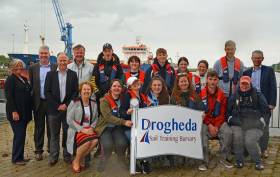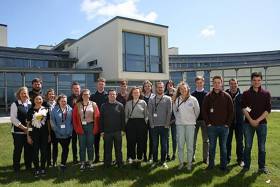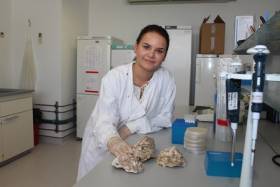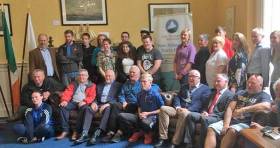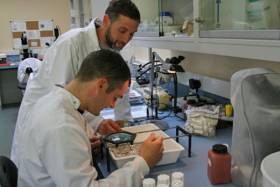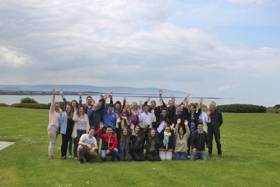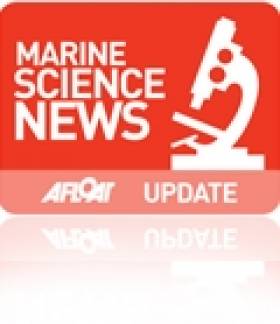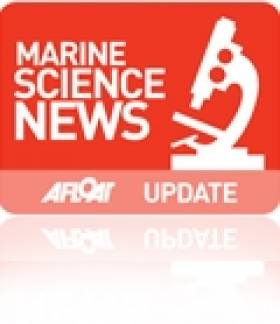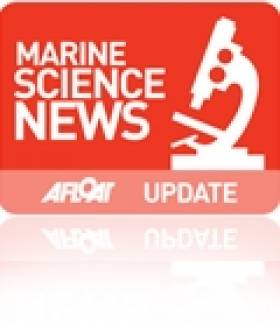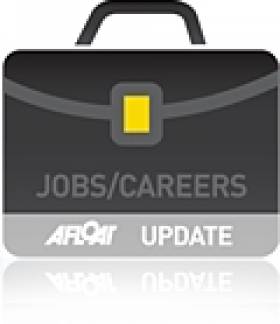Displaying items by tag: bursary
The sixth annual Drogheda Sail Training Bursary Voyage set sail on Sunday 9 June when a new group of local teenagers boarded the tall ship Brian Ború at Fiddle Case Pier.
The teens, aged between 15-17, were nominated by their local schools Greenhills, Sacred Heart, St Mary’s and Gormanston and were raring to give it a go, having heard great things about the experience from previous trainees.
Skipper Peter Scallan greeted the trainees and quickly got to work with the safety briefing and emergency drills. Within hours the trainees, who were all strangers to each other, had begun to mix well and were busy in the ship’s galley preparing dinner.
Afterwards they assisted the captain in preparing the navigational plan for the week ahead and spent their first night onboard in Drogheda.
At 8am the following morning their adventure began. The first stop was Clogherhead — and a VIP tour of the village’s RNLI station to see one of Ireland’s newest lifeboats, the Shannon class Michael O’Brien.
From there the journey took them to Lambay Island — home to a colony of wallabies — then on to Howth.
The trainees had by now become a great team and strong friendships were forming. They were learning and growing in confidence with every nautical mile — 54 at this point.
Scrubbing the decks (also known as ‘Happy Hour’), preparing meals, keeping watch, writing logs, the young crew were working flat out.
After passing Ireland’s Eye and the Bailey Lighthouse, the Brian Ború arrived in Wicklow for some well-earned relaxation time spent fishing, swimming and enjoying the beauty of life at sea.
From Wicklow, the return passage took them to Dun Laoghaire Harbour for the night, then another overnighter, this time at Malahide Marina for some yacht-spotting, before the final 26 nautical miles homeward bound last Friday morning 14 June.
The newly skilled sailors received a warm welcome home at Harbourville from family, friends and bursary schene sponsors Irish Cement, Fast Terminals, Louth County Council and Drogheda Port Company.
The sponsors in association with Sail Training Ireland presented trainees with a certificate of achievement and commended them on embarking on this challenging adventure.
Next year’s voyages promise to be every bit as exciting. If you are interested in taking part, contact Drogheda Port Company for details.
#MarineScience - Twenty-five third level undergraduates have joined the Marine Institute this summer to gain work experience in variety of areas including fish and shellfish assessment and monitoring, catchment research, and the management of the national research vessels as well as maritime finance.
The Marine Institute’s annual Bursary Scheme is already well under way for 2018, with students from a wide range of disciplines from all over Ireland taking part in a variety of exciting 8-12 week programmes.
“The bursary programme gives students an opportunity to gain valuable experience within their chosen subject field,” says Helen McCormick, senior laboratory analyst. “Previous bursars have gained various positions within the Marine Institute at all grades up to and including director level.”
The bursars are working at a variety of different sites all over the country, with many in the Marine Institute at Oranmore, and others working from the institute’s catchment research facility in Newport, Co. Mayo.
Bursars are also working at local sites in Cork, Waterford and Derry, where they are taking part in wild salmon assessment and fisheries sampling.
Dr Peter Heffernan, CEO of the Marine Institute, welcomes the students, saying: “The marine bursary is an extremely well-established scheme that strives to provide students with the necessary skills they will need to succeed in areas related to marine science. The institute is delighted to support this excellent learning opportunity for Irish students."
Many of the students will be taking part in frontline research projects in laboratories, whereas others will be working with the policy team and the communications department in corporate services.
Ocean literacy and communication are a huge part of the bursar experience at the Marine Institute and so over the next month, many of the students will be helping with the Our Ocean Wealth Summit and SeaFest 2018, which take place later this week in Galway.
Marine Institute Summer Bursary Scholarship Scheme Opens For 2018
#MarineScience - The Marine Institute is inviting marine science students to apply for a number of work experience placements for summer 2018.
The Marine Institute Bursary Scholarship Scheme provides scholarships worth €275 per week for an eight-to-12-week placement (bursary dependant).
Scholarship recipients will be based in various locations including the Marine Institute HQ in Oranmore, Co Galway; Newport, Co Mayo and other locations and ports around the country.
The Bursary Scholarship Scheme provides valuable practical experience for students in areas of research such as marine fisheries, salmon management, aquaculture, oceanography, benthic ecology, communications and R&D.
The programme is aimed at undergraduates of universities, institutes of technology and national institutes for higher education, and is strictly limited to those who will have completed two years’ study in a relevant discipline by the beginning of June.
Previous bursars have gone on to work in the Marine Institute (including two directors of the institute), Bord Iasaigh Mhara, Regional Fisheries Boards, county councils, pharmaceutical companies and State laboratories, with some going as far afield as the EPA in Sydney, Australia and others now running their own companies.
To apply for the Marine Institute Summer Bursary Programme for 2018:
- Check out the bursary titles on offer
- Select the two bursaries that interest you most and in order of preference
- Complete the application form and return it FAO Annette Jordan, Marine Institute, Furnace, Newport, Co Mayo
The deadline for applications is Friday 9 February.
Sail Training Ireland Presents Awards For Waterford Bursary Voyages
#TallShips - Sail Training Ireland’s 2017 Waterford Bursary Scheme voyages came to a successful conclusion on Friday at a presentation ceremony held in the historic Mayor’s Parlour in Waterford city’s town hall.
Mayor of Waterford City & County Council Pat Nugent presented certificates to the 20 trainees who took part in two week-long sail training voyages.
The Waterford trainees sailed on board local ketch Brian Ború, skippered by owner Tony McLoughlin. After a six-day voyage they sailed into Waterford city to be met by friends, family, and supporters.
The voyage had some challenging sailing conditions that the newly formed crew faced down with growing confidence as they formed a tight knit team who overcame adversity, which is a key part of a good sail training programme.
The happy participants told tales of sightings of dolphins and even a whale, along with monkfish suppers, sing alongs and storytelling. They urged others to get involved in the opportunity of a lifetime.
A note received by Sail Training Ireland from Faye Kennedy who took part really illustrates the essence of the experience:
“Although I am an average 17-year-old teenager from Waterford city, I am different to most, as I have had to deal with a chronic illness. My illness does not define me; however, it does challenge me. Sail Training Ireland has pushed me to overcome the challenges of life at sea. It has also encouraged me to believe in my own potential. I take away a new-found love of sailing with memories of the best week of my life.”
The bursary was established in 2016 in partnership with Port of Waterford, Waterford City and County Council and Waterford Area Partnership, who have generously supported the scheme again this year.
The scheme provides access to the life-changing experience of a sail training voyage for young people from the Waterford region aboard large sailing vessels and tall ships.
A key objective of Sail Training Ireland is to raise financial support to ensure that no young person is excluded from participation due to financial constraints.
The development of Regional Bursary Schemes has proven to be a very successful approach to providing this support.
Daragh Sheridan, chief executive of Sail Training Ireland, also spoke of his “delight at seeing a group of strangers at the beginning of the week becoming great friends by the end of it.”
Sail Training Ireland hopes that with the continued support of the existing supporters and the addition of some new sponsors that the scheme will be expanded next year. Visit
www.sailtrainingireland.com for more information or contact the charity at 01 816 8866 or [email protected].
#MarineScience - The Marine Institute is inviting students to apply for a number of work placement bursaries in many exciting areas for the summer of 2017.
The Marine Institute Bursary Scholarship Scheme is worth €275 per week for an eight- to 12-week placement, bursary dependant. Placements will be based in various locations including the Marine Institute at Oranmore, Co Galway; Newport, Co Mayo; and other locations and ports around the country.
The Marine Institute's Bursary Scholarship Scheme provides valuable practical experience for marine science students in areas of research such as marine fisheries, salmon management, aquaculture, the Fish Health Unit, oceanography instrumentation, benthic ecology, communications and R&D.
Last summer’s programme saw 28 students from across Ireland embark on work placements in a variety of areas including salmon and shellfish assessments, fish sampling at ports, maritime economics and even app development.
The programme is aimed at undergraduates of universities, institutes of technology and national institutes for higher education. The scheme is strictly limited to undergraduates who will have completed two years study in a relevant discipline by the beginning of June.
Previous bursars have gone on to work in the Marine Institute (including two directors of the institute), BIM, Regional Fisheries Boards, county councils, pharmaceutical companies and State laboratories, with some going as far afield as the EPA in Sydney, Australia, and others now running their own companies.
To apply for the Summer Bursary Programme, check out the bursary titles on offer, and select the two bursaries that interest you most in order of preference. Then complete the application form and return it FAO Annette Jordan, Marine Institute, Furnace, Newport, Co Mayo by the deadline of Friday 10 February.
Marine Institute Summer Bursar Programme Returns
#MarineInstitute - The annual Marine Institute bursar programme begins this month with 28 students from various third-level institutions starting summer work placements.
Over eight weeks, the students will work in a variety of areas including salmon assessments, fish sampling at the ports, shellfish assessment, maritime economics, education, application development and oceanographic sciences.
"The work experience programme gives students from a wide variety of disciplines a chance to further their knowledge and research in their particular area of interest and to expand their professional networks within Ireland and internationally," said Helen McCormick, senior laboratory analyst at the Marine Institute and co-ordinator of the bursar programme.
As previously reported on Afloat.ie, the placements will give students practical and hands-on experience at different locations around Ireland, including the offices and laboratories at the Marine Institute, Galway; Wilton Place, Dublin; and Burrishoole Catchment, Newport, Co Mayo. Some students will also be located at other locations around the country in counties Cork, Limerick, Derry and Waterford.
The summer bursar programme has been ongoing since the 1960s and is a highly sought-after work experience programme in the marine science sector and continues to offer a promising gateway into the expanding areas of marine science and research in Ireland.
Dr Peter Heffernan, CEO of the Marine Institute, congratulated all successful bursars on this year's programme. "The Institute is delighted to support this excellent learning opportunity for Irish students as well as highlight the future employment opportunities for undergraduates and postgraduates within the marine sector," he said.
Students Join Marine Institute For Summer Science Placements
#MarineScience - The annual Marine Institute bursary programme gets underway this month with 23 third-level students from academic institutions in Ireland and the UK joining the institute for eight weeks.
Every year up to 150 of third-level students across Ireland apply for the Marine Institute's highly sought-after bursary programme, which is well recognised in the industry as its purpose is to promote future employment opportunities for undergraduates and postgraduates.
"The work experience programme enables students from a wide variety of disciplines to further their knowledge and research in their particular area of interest and it offers the students to expand their professional networks within Ireland and internationally," explained Helen McCormick, senior laboratory analyst at the Marine Institute and co-ordinator of the bursary programme for 2015.
The students will work in a variety of areas including fish and shellfish assessments and surveys, sampling salmon and commercial fisheries in ports, maritime economics, oceanographic equipment modifications and communications.
The placements will provide students with practical and hands-on experience at different locations around Ireland, including the offices and laboratories at the Marine Institute - Galway, Harcourt Street in Dublin and the Burrishoole Catchment at Newport, Co Mayo. Some students will also be located at fisheries ports in counties Cork and Waterford.
The summer bursary programme has been ongoing since the 1960s in the marine science sector and continues to offer a promising gateway into the expanding areas of marine science and research in Ireland.
Dr Peter Heffernan, CEO of the Marine Institute congratulated all successful bursars on this year's programme, saying: "The institute is delighted to support this excellent learning opportunity for Irish students."
Student Bursars Wanted For Marine Institute Work Experience Programme
#MarineScience - The Marine Institute is inviting students to apply for a number of work experience placements in many exciting areas for this summer 2015.
The bursaries are worth €2,200 each for an eight-week placement based in various locations including the Marine Institute in Oranmore, Co Galway; Newport, Co Mayo; Harcourt Street, Dublin; and ports around the country.
The Marine Institute's Bursary Programme provides valuable practical experience for students, in areas of research such as marine fisheries, salmon management, aquaculture, environment, communications, oceanography, maritime development and bio-discovery.
The bursary programme is aimed at undergraduates of universities, institutes of technology and national institutes for higher education. The Scheme is strictly limited to undergraduates who have completed two years study in a relevant discipline.
Previous bursars have gone on to work in the Marine Institute (including two directors of the institute), Bord Iascaigh Mhara, regional fisheries boards, county councils, pharmaceutical companies and State laboratories, with some going as far afield as the EPA in Sydney, Australia and some now running their own companies.
To apply for the summer bursary programme, see the list of bursary titles on offer (Word doc), select the two bursaries that interest you most (in order of preference), complete the application form (Word doc) and return it FAO Annette Jordan, Marine Institute, Furnace, Newport, Co Mayo. The deadline for applications is Friday 13 February 2015.
#marinescience – The annual Marine Institute bursary programme gets underway this month (June, 2014) with 22 third-level students. Over eight weeks the students will work in a variety of areas including fish and shellfish assessments and surveys, sampling salmon and commercial fisheries in ports, maritime economics, oceanographic equipment modifications and communications.
"The student summer bursary programme has been ongoing since the 1960's and has great historical importance to the marine science sector. The work experience programme enables students from a wide variety of disciplines to further their knowledge and research in their particular area of interest and it offers the students to expand their professional networks within Ireland and abroad," explained Ms. Helen McCormick, Senior Laboratory Analyst at the Marine Institute and co-ordinator of the bursary programme for 2014.
The students will gain hands on experience at different locations around Ireland, including the offices and laboratories at the Marine Institute - Galway, Harcourt Street - Dublin and Burrishoole Catchment - Newport, County Mayo. Some students will also be located at fisheries ports in counties Cork, Waterford and Louth.
With the publication of "Harnessing Our Ocean Wealth" in July 2012, Ireland is expected to promote investment and enable growth within the marine sector. The bursary programme offers a promising gateway into the expanding areas of marine science and research in Ireland.
The programme is well recognised and aims to promote future employment opportunities for undergraduates and postgraduates. Dr Peter Heffernan, CEO of the Marine Institute congratulated all successful bursars on this years programme saying, "The Institute is delighted to support this excellent learning opportunity for Irish students".
Student Bursars Wanted for Work Experience Programme
#jobs – The Marine Institute is inviting students to apply for a number of work experience placements in many exciting areas for this summer 2014. The bursaries are worth €2,200 each for an eight week placement based in various locations including the Marine Institute, Oranmore, Co. Galway, Newport, Co. Mayo and Harcourt Street, Dublin and ports around the country.
The Marine Institute's Bursary Programme provides valuable practical experience for students, in areas of research such Marine Fisheries, Salmon Management, Aquaculture, Environment, Communications, Oceanography, Maritime Development and our EU Desk.
The Bursary Programme is aimed at undergraduates of Universities, Institutes of Technology and National Institutes for Higher Education. The Scheme is strictly limited to undergraduates who have completed two years study in a relevant discipline. Previous bursars have gone on to work in the Marine Institute (including two Directors of the Institute), BIM, Regional Fisheries Boards, county councils, pharmaceutical companies, State Laboratories, with some going as far afield as the EPA in Sydney Australia and some now running their own companies.
To Apply for the Summer Bursary Programme:
o Please check out the bursary titles on offer
o Select the two bursaries that interest you most and in order of preference
o Complete the Application Form and return it FAO Annette Jordan, Marine Institute, Furnace, Newport, Co Mayo
o Application Deadline Date is 7th February 2014



























